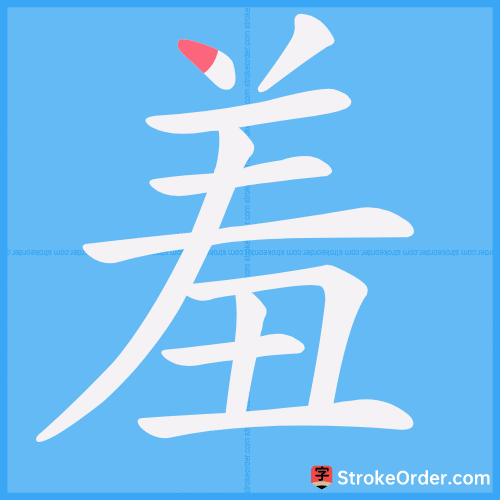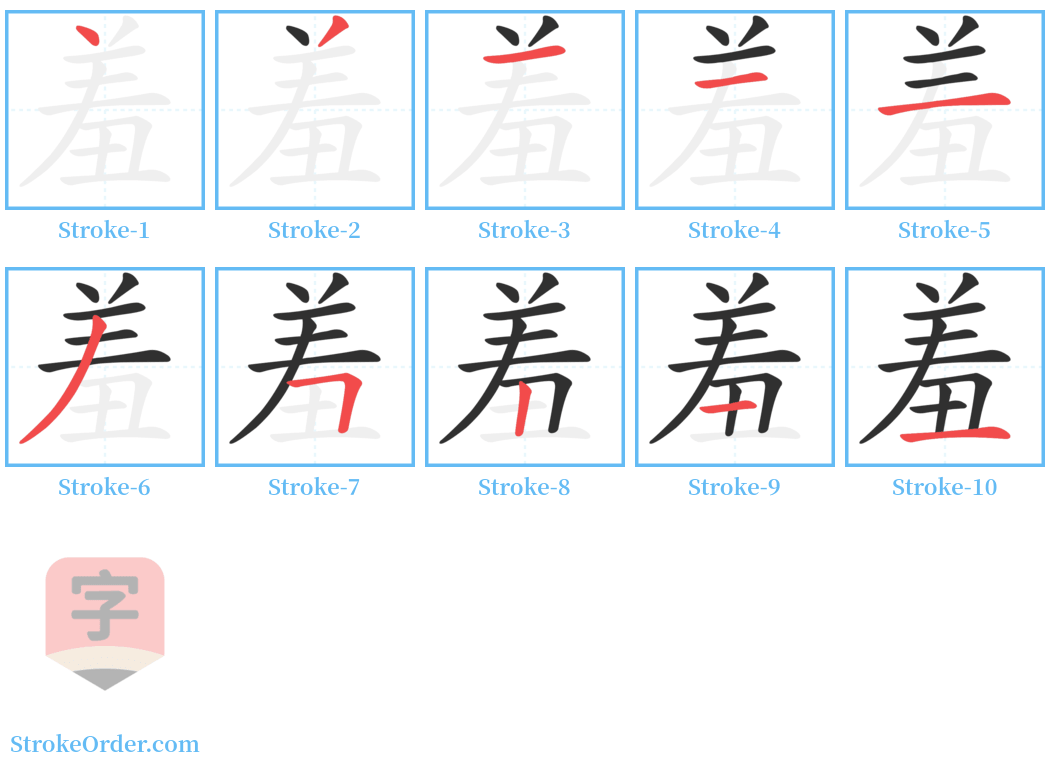羞 Stroke Order
Animated Stroke Order of 羞

Stroke Order Diagrams for 羞

Step-by-Step Handwriting Guide for 羞

Learn to Write Chinese Characters with Video Tutorials
Watch the video of writing the Chinese character "羞", learn the correct stroke order (笔顺) of the character "羞", and master the standard way of writing the character "羞".
Free Printable Handwriting Practice with Stroke Order: 羞
Printable Writing Practice Worksheet of "羞" in Portrait Orientation (Tian Zi Ge)

Printable Writing Practice Worksheet of "羞" in Landscape Orientation (Tian Zi Ge)

Information of 羞
Pinyin
xiū
Radical
羊
Strokes
10 strokes
Usage
★★★★★
Definition
shy / ashamed / shame / bashful
羞 [xiū]
1. 感到耻辱。
[En.] To feel shame.
2. 难为情,害臊。
[En.] To be embarrassed, to feel shy.
3. 使难为情。
[En.] To embarrass someone.
4. 进献。
[En.] To offer.
5. 同“馐”。
[En.] Same as "馐" (food).
---
羞 [xiū]
【本义】: 进献
[En.] Original meaning: To offer.
【造字法】: 会意兼形声。据甲骨文,以手持羊,表示进献。小篆从羊,从丑,丑亦声。“丑”是手的讹变。
[En.] Character construction: A combination of meaning and sound. In oracle bone script, it is depicted as holding a sheep, signifying an offering. The small seal script combines "sheep" and "ugly," with "ugly" also indicating sound.
1. 同本义 ([En.] offer)
2. 推荐; 进用 ([En.] recommend)
3. 假借为“丑”。感到耻辱 ([En.] to feel shame)
4. 因惭愧而难为情 ([En.] to feel shy; to be abashed)
5. 嘲弄; 侮辱 ([En.] to mock; to poke fun at; to insult)
6. 怕 ([En.] fear)
---
熟的食物 (【英】:cooked food)
---
【引】
1. 《说文》:羞,进献也。从羊,羊所进也。
[En.] "Shu" means to offer. It comes from "sheep," which is what is offered.
2. 《周礼·宰夫》:以式法掌祭祀之戒具,与其荐羞。 注:“庶羞,内羞”。按,内羞,房中之羞也。
[En.] "In ritual practices, recommend offerings to the spirits, including both internal and external offerings."
3. 《周礼·笾人》:共其笾荐羞之实。 注:“荐羞皆进也。”
[En.] "The offerings are collected together for presentation."
4. 《左传》:可荐于鬼神,可羞于王公。
[En.] "Can be presented to gods and shamelessly offered to lords."
---
【例】
1. 羞豆(古代祭祀宴享时进献食物的一种盛器)
[En.] "Shiu Dou" (a vessel for offerings during ancient sacrificial feasts).
2. 羞膳(进献食品)
[En.] "Shiu Shan" (food offered).
---
羞 [xiū]
无论是对于食物,还是感情,"羞"字都与进献和羞愧紧密相关。
[En.] The character "羞" is closely related to offerings and feelings of shame, whether regarding food or emotions.
Input Method for 羞
Pinyin
xiu1
Wubi
udnf|unhg
Cangjie
tqng
Zhengma
ucxe
Four Corner
80102
Unicode
U+7f9e
Same Pronunciation Characters